
Lot 81
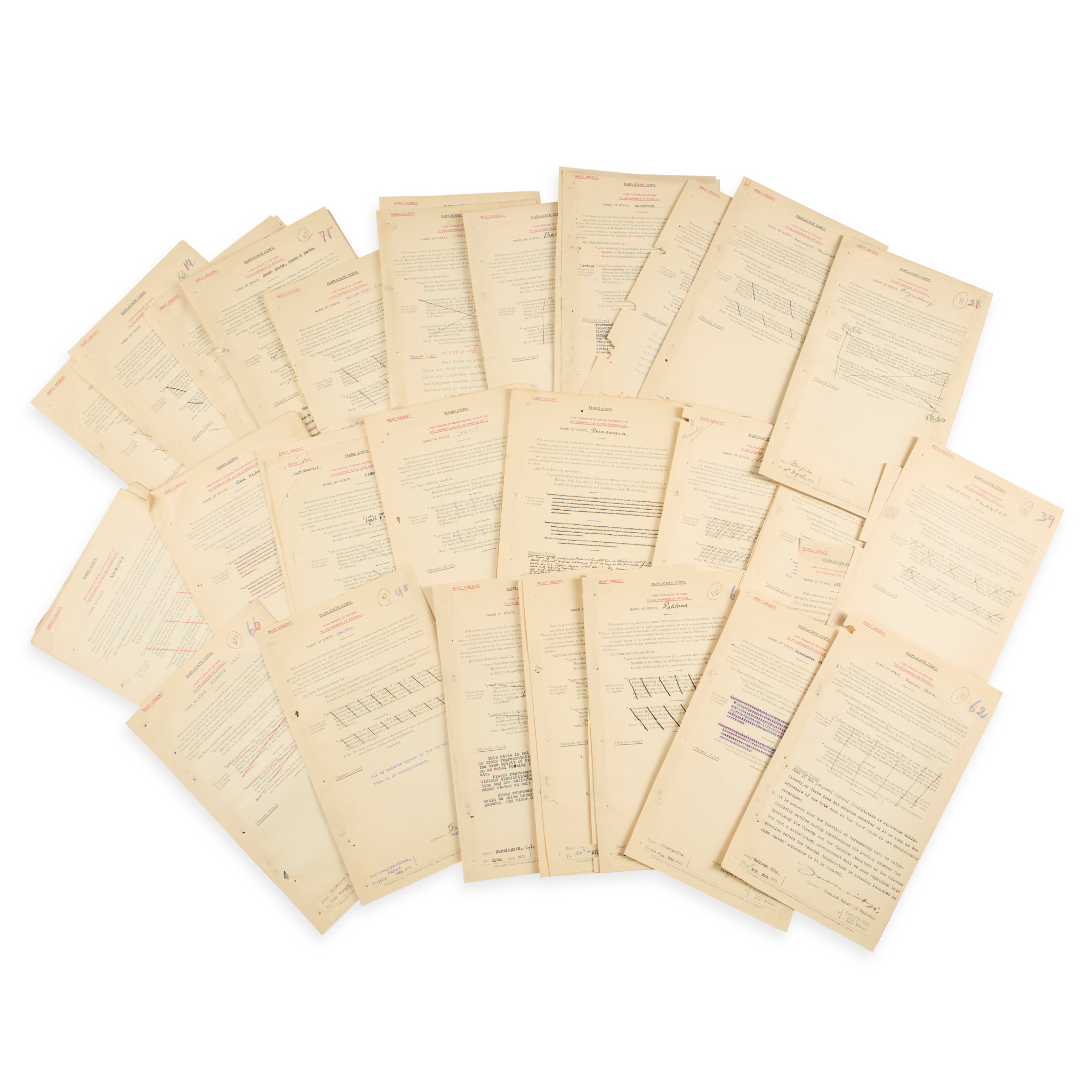
India - Chamber of Princes (Narendra Mandal)
Large collection of documents signed by Indian princes, 1932
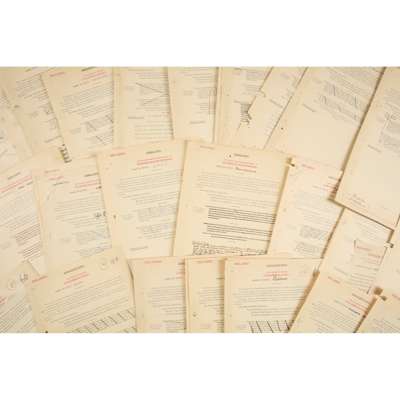
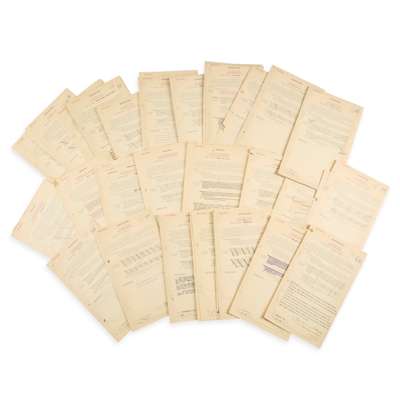


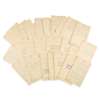
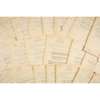
Auction: 18 June 2025 from 10:00 BST
Description
1) 46 copies of a printed questionnaire on the projected constitution of a federalised India, enquiring whether the responding state stands for ‘equal individual representation', ‘plural representation’ or ‘representation by Provincial, or other groups’ in the Chamber of Princes (with answers deleted as appropriate), comprising 38 duplicate copies marked for favour of return to His Highness of Patiala’ (14 of which with typed remarks by the respondent), and 8 third copies marked ‘for favour of being posted direct to His Highness the acting chancellor’ (one of which with handwritten remarks), each a single foolscap sheet (34.5 x 21cm, punch-holes along left-hand margins, many with old paper reinforcement on versos), all signed by the prince of the responding state, comprising: Benares (Aditya Narain); Jhalawar (Rajendra Singh); Jaora (Iftihkhar Ali Khan); Baoni (Mushtaq Al Hasan); Rajgarh (Birendra Singh); Dewas Junior (Malhar Rao); Orchha (Vir Singh Dev); Sawantwadi (Khem Sawant Bhonsle); Kotah (Umed Singh); Narsingarh (Vikram Singh); Morvi (Lakhdirji); Wadhwan (Jorawarsinhji); Khilchipur (Durjansal Singh); Kishangarh (Yagya Narayan Singh); Sikkim (Tashi Mangyal); Bhuj (Khengarji III); Bansda (Indrasinhji); Dhrol, Kathiawar (Jorawarsinhji); Dungarpur (Lakshman Singh); Sirmoor (Amar Prakash); Ajaigarh, Central India (Bhopal Singh); Jhabua, Central India (Udai Singh, signing in Hindi); Baria (Rantijsinhji); Porbandar (Natwarsinhji Bhavsinhji); Partabgarh, Rajputana (Ram Singh); Alirajpur (Pratap Singh); Janjira (Kulsum Begum, signing as regent); Radhanpur (Jalaluddin Khan); Rajkot (Dharmendrasinhji); Palitana (Bahadursinhji); Dhrangadra (Ghanshyamsinhji); Loharu, Punjab (Aminuddin II); Suket (Lakshman Sen); Rampur (Raza Ali Khan); Sitamau (Ram Singh); Palanpur (Taley Muhammad Khan); Mayurbhanj (Pratap Chandra Bhanja Deo); Banswara (Prithvi Singh); Ratlam (Sajjan Singh); Limbhi (Daulatsinhji); Sant (Nichhabhai K Desai); Sailana (Dileep Singh); Bijawar (Sawant Singh); Maler Kotla (Ahmad Ali Khan); Manipur (Chura Chand Singh). Together with: two other ‘third’ copies signed by the dewans of Chhota Udaipur and Chhatarpur, one ‘third’ copy signed by the foreign secretary of Mandi, and a similar document signed by the Maharaja of Jaipur (1931).
2) 18 signed copies of a printed response to the chancellor of the Chamber of Princes (presumably the Maharaja of Patiala, addressed as 'Your Highness', one response with typed address to Patiala at head), 1931, outlining conditions for acceptance of a new constitution ('It is my definite and considered opinion that no constitution will be acceptable to me which involves, inter alia, 1) The creation of a new State and consequent imposition of uniform nationality and double allegiance on the subjects of the States. 2) Infringement of the rights, privileges, and prerogatives of the Rulers of the Indian States. 3) Any infringement upon … the treaties, sanads and engagements of the Indian States without the consent of the State concerned …'), each a single sheet (24.2 x 16.5cm, pasted to paper mount), each signed by a ruler of a princely state, i.e. the princes of Chhatarpur (Vishwanath Singh), Banswara (Prithvi Singh), Sukhet (Lakhsman Sen), Maihar (Brijnath Singh), Ajaigarh (Bhopal Singh), Bhor (R. S. Pant Sachiv), Lohara (Amirudddeen, as ‘nawab regent’), Keonthal (Hemendra Sen), Morvi (Lakhdirji), Bijawar (Sawant Singh), Rajgarh (Birendra Singh), Sonepur (Mitrodaya Singh Deo), Tehri Garwhal (Narendra Shah), Chamba (Ram Singh), Jhalawar (Rajendra Singh), and Bahawalpur (Sadiq Muhammad Khan V), Limbdi (Daulatsinhji), and Dewas Junior (Malhar Rao Pawar).
3) Approx. 18 related printed documents, mainly minutes and proceedings of meetings of the Council of Princes, many marked as proof or confidential, and including: i) List of Ruling Princes and Chiefs who are Expected to attend the Conference of Ruling Princes and Chiefs to be held in Delhi from 20th to 25th January 1910, Delhi: SGPI, 1919 (proof copy, printer's slug indicates 20 copies printed, folio, 7 pp.); ii) Minutes of the Proceedings of the Informal Meeting of the Ruling Princes held on the 18th [-19th, 24th] of January, 1919, Delhi: IMH Press, 1919 (3 documents, each marked ‘Confidential’, folio, 4, 2, 2 pp.); iii) Proceedings of the Meeting of the Chamber of Princes (Narendra Mandal) held at New Delhi on the 17th and 18th March 1941, Delhi: GIPD, 1941 (uncorrected proof, one of 300 copies); iv) Opinion of the Right Honourable Sir Tej Bahadur Sapru, P.C., on Certain Questions Arising out of the Government of India Act, Delhi: National Journals Press, 1937 (folio, 27 pp., original printed wrappers, ‘Property of His Highness the Maharaja of Patiala’ printed at head of front wrapper; and similar
Footnote
The responses to the questionnaire relating to the projected constitution of a federalised India are very strongly in favour of the principle of equal individual representation for the princely states, a typical remark being that of Rajendra Singh, ruler of Jhalawar, who avers that: ‘Even if the proposed Federal constitution is otherwise satisfactory, my State does not propose adhering to it so long as the principle of one vote each in the Upper House is not specifically recognised’. Exceptions include the state of Sawantwadi, whose ruler responds that 'the Durbar is in favour of limited plural representation, somewhat on the lines of the German Republican constitution, but with much more stringent limitations'.





